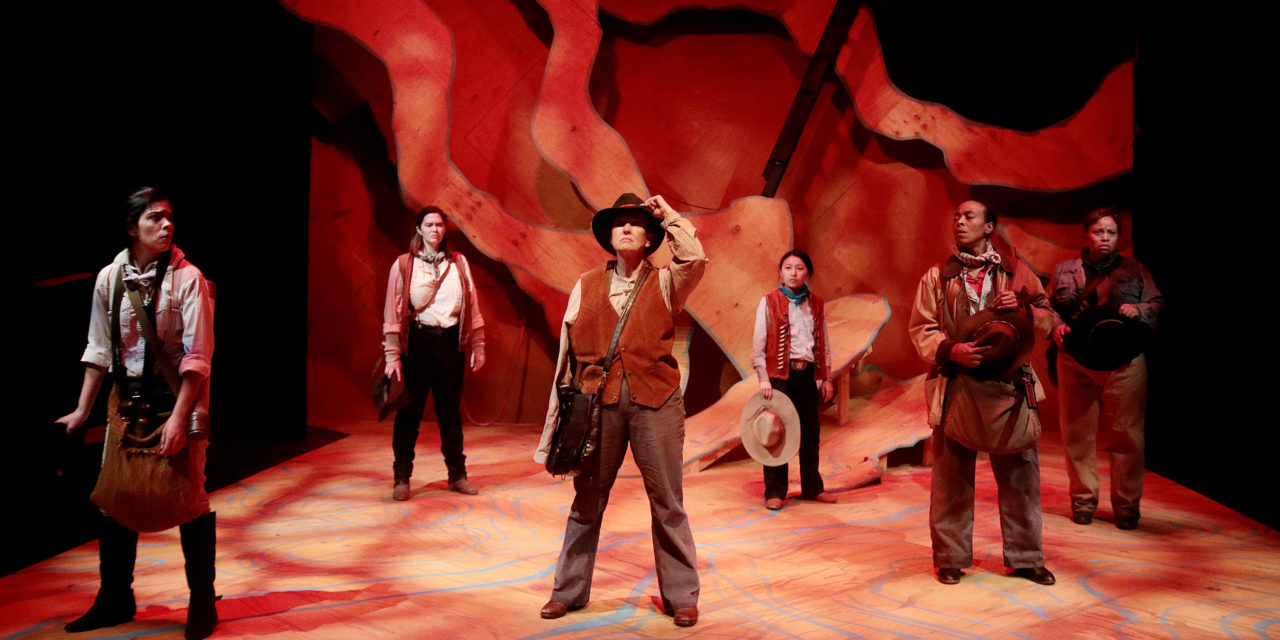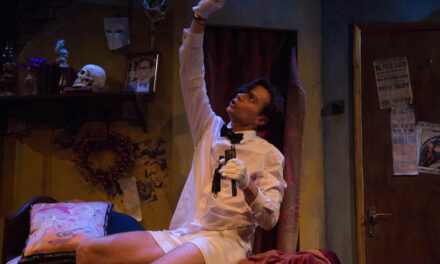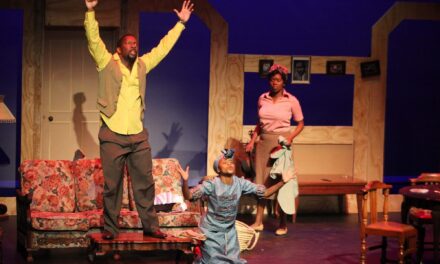In a city that still has a relatively conservative theatre community such as Houston, seeing ten women on stage in a play written by a woman certainly deserves our attention. That the majority of these women are people of color only adds to the sense of urgency that Main Street Theater’s production of Jaclyn Backhaus’ Men On Boats brings to the 2017-2018 theatre season. Backhaus’ play dramatizes the 1869 expedition of the Colorado River and the Grand Canyon, following Major John Wesley Powell (played by Celeste Roberts) and a crew of volunteers who journey to chart the Colorado River. Backhaus uses Powell’s journal to dramatize the (mostly) accurate chronicle of the expedition. Main Street’s production of Men On Boats runs February 10 to March 11, 2018.
Under the direction of Philip Hays, Men On Boats is perfectly cast. I jokingly told theatre critic Doni Wilson before the show started that all of my favorite Houston actors were in the production. As soon as Patricia Duran, Candice D’Meza, Mai Le, and company took the stage, I realized that I wasn’t joking after all. Men On Boats is poignant, funny, and fresh. Nevertheless, I’m not interested in reviewing the play. I’m more interested in contextualizing the production within the Houston theatre landscape. That being said, go see this production!
At first glance, the cast of Men On Boats doesn’t appear to match the title. While the historical figures in the play were indeed cisgender Anglo males, the cast is entirely comprised of actors who are anything but cisgender Anglo males. Women play all the roles. It’s not done in a campy way; rather, it is done as a way to add a fresh lens to the often male-centered world of expeditions. According to Backhaus, “It’s interesting for me to take that idea of male conquest, give it to someone who usually doesn’t have that right, and put that into the roles themselves. It begs the question of what histories are we lacking.” Backhaus questioned why she could write a play about an all-male expedition team, but not be in the show. From here, the theatrical framework of the play began to take shape. Men On Boats poses the questions: What histories are we lacking when history is only told by straight white men? And, what new perspectives do the historical and dramatized expeditions take on when the story is told in this way?
Not unlike the mega-hit Hamilton which re-imagines the Founding Fathers as people of color, Men On Boats offers a new perspective on a time period when women weren’t given the same opportunities as men. And, to Backhaus’ credit, the fact that women play the roles is never an issue or a punch line. By and large, Men On Boats doesn’t address the elephant in the room and, to me, this allows it to go further. All in all, the production speaks to struggles and situations that span people of all identity markers.

Candice D’Meza, Mai Le, and Patricia Duran in Men On Boats at Main Street Theater. Photo credit: Pin Lim/Forest Photography.
And, as one can imagine, productions such as Men On Boats have the potency to be transformative for the artists involved. After opening night on February 10, I spoke with Mai Le, who plays Seneca Howland (and has one of the funniest moments I’ve seen on stage with partner-in-crime Candice D’Meza):
I love working with such a diverse cast, because the range of cultural experiences we all bring to the table is so incredibly vast. And our diversity doesn’t just affect the show onstage, but it brings such an electricity to every conversation we have as people behind the curtain. We are a group made of both veteran and green artists; of mothers and wives and single women; of daughters who can trace their lineage from all over the world—our differences can fill out a list from wall to wall, but are all united by our desire to pull together a cohesive, energetic, fun, and vibrant show. There’s so much to learn from everyone, and we all feed—and feed off of—each other so well! And on a more personal note, I’m so incredibly thankful that Jaclyn Backhaus wrote this script the way she did—with “racially diverse actors who are female-identifying, trans-identifying, genderfluid and/or non-gender-conforming” playing these “historically cisgender white males”—and that Main Street chose to produce this show. It’s a great opportunity to see a cast of women excel on a plane outside of any stereotype we are often seen performing in.
D’Meza, who plays O.G. Howland, echoes Le’s thoughts:
Being apart of a cast that spans various ethnicities and ages, not only gives us actors a chance to connect and share across boundaries, but also gives us another by-in into the predominantly white male narratives that proliferate American history. In that way, it has been a cathartic and also uplifting experience to be apart of, and a necessary addition (and guidepost) to the future of Houston theater.
Since its founding in 1975, Main Street has been one of Houston’s most consistent theatre companies in terms of producing women playwrights and employing female directors. With Men On Boats, Main Street is certainly doing their part in creating an inclusive theatre community.
This post was written by the author in their personal capacity.The opinions expressed in this article are the author’s own and do not reflect the view of The Theatre Times, their staff or collaborators.
This post was written by Trevor Boffone.
The views expressed here belong to the author and do not necessarily reflect our views and opinions.

















